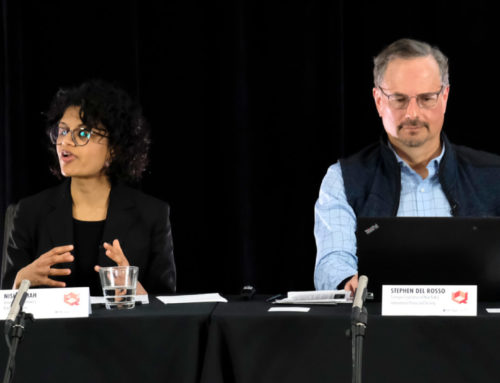If Friday’s opening Q Effect panel opened the theoretical possibilities for quantum IR, the afternoon’s Geo-Security: Risky States, States at Risk, and the Indo-Pacific panel re-grounded the conference in the pressing complexity of security concerns specific to the region.
Panel moderator Bates Gill, CEO of the United States Studies Centre at the University of Sydney, explained that this panel would take a unique form relative to the others. Leading things off would be a presentation by Vice Admiral Ray Griggs, AO, CSC, and Chief of the Royal Australian Navy on his thoughts on Australia’s place and role in the region. After the VA’s presentation, CISS scholars with a wide-ranging range of specialties would speak to their work and its applications in light of the Admiral’s presentation.

A diagram of the Bohr Model of the atom, in which a nucleus is surrounded by electrons on various orbital paths. (Photo: Wikimedia Commons)The panel took a form akin to the Bohr model of the atom, which theorized in 1913 that atoms consisted of a positively-charged nucleus of protons and neutrons, orbited by electrons at varying levels of proximity.
With Griggs’s presentation the nucleus, CISS researchers would present their research as it related to various degrees despite their different orbits, all contributing to a thorough and coherent conversation about security in the Indo-Pacific.
VA Griggs assumed his role, beginning his talk by looking for a core essence of Australian identity and interests as a foreign policy actor. He spoke of an Australian obsession with figuring out “who we are and where we sit” globally and regionally, bemoaning that such soul-searching never seemed to sufficiently convince Australians of the inevitable conclusion that their country is an island: a maritime nation utterly dependent on the sea for prosperity and security.
For this reason, he championed the use of the term Indo-Pacific, stressing Australia’s geo-political position between two interrelated environments crucial for security and commerce. Australia’s core national security interests, he proposed in front of a projection of the crucial trade routes crisscrossing the region, were inherently maritime and dependent on the maintenance of good order at sea to maintain those vital trade routes. Without such order, Australia would be in dire straits. Griggs pointed out that 98% of the nation’s trade is sea-based, with 9 out of its top 10 trading partners are in the Indo-Pacific. If sea routes are interrupted or threatened, Australia only has petrol reserves sufficient for 23 days of consumption.
As a result of this position, Griggs emphasized that Australia be cognizant of the fragility of naval chokepoints throughout the region. In response, he emphasized the importance of developing a security architecture capable of coordinating cooperation in a region he described as “diffuse, diverse and multi-polar,” in a world no longer characterized by Cold War habits of cooperation. He pointed to recent joint naval exercises with regional partners like China and Japan and the importance of confidence-building measures (CBMs).
With cooperation still key—Griggs highlighted the successful international effort to deter piracy in the Straits of Malacca—Australia needs to commit itself to the development of a regional maritime order. Instead, Griggs sees the establishment of his country dominated by what he called the “territorial” and “expeditionary” doctrines, failing to account for the island nation’s maritime reality. As a result, Griggs concluded his remarks by warning that Australia risks misunderstanding or undervaluing the maritime, increasing the risk of ill-adapted responses to emergent threats and opportunities.

Vice Admiral Ray Griggs, AO, CSC, RAN, (centre) flanked by (L-R) James Reilly, Sarah Phillips, John Lee, and Bates Gill (Photo: Jose Torrealba)
Before handing off the panel to the CISS orbits, Gill remarked that despite the forward-looking nature of the conference, it was good to be reminded that understandings of security were still constrained by traditional considerations like territory, societal structures and conventional diplomacy.
Nonetheless, the CISS scholars showed the vast complexities of even “conventional” security concepts. Leading off was Ryan Griffiths, whose research focuses on state failure, secessionism and sovereignty. He identified the Indo-Pacific as a region ripe with opportunities for new states, as the conventional international governance structures did not have the sort of over-arching body colluding to stymie alternative sovereignty claims that we see in other regions, like the African Union. In his view, regional security structures would do well to begin reckoning with these kinds of potentialities.
Next was Justin Hastings, whose work focuses on piracy and smuggling. He alluded to the projection of trade routes in Griggs’s presentation, noting that it failed to depict an equally intricate and dense network of informal trade routes. As a result of such networks, threats can come seemingly out of nowhere with state and non-state groups, such as those responsible for the Bali bombings, aided by grey and black markets and trade routes. Of interest as well was the trend towards containerization, which encouraged transshipment hubs, supply chains, and made non-state actors more vulnerable to surveillance and interdiction. He emphasized that recognizing this was just as important, if not more so, than traditional military cooperation in eliminating piracy in the Straits of Malacca, as enforcement was more effective on paper and the true impact came from eliminating informal markets for pirates to ply their plunder.
Taking over from here was John Lee, who spoke of China’s rise as a naval power in the Pacific. He spoke of conversations he had at a meeting of defense ministers of maritime powers, specifically of one with a Chinese officer who seemed interested in understanding China’s relative international isolation in the region. Lee relayed his answers to the officer to the crowd, emphasizing three potential possibilities. First, he feels that the region is uncomfortable by the thought of a regional hegemon, an observation related to the second, that the United States is more tolerable due to its geographical distance from the area. Lastly, traditional threats to sovereignty and territory are being supplanted by valuations of the global economy itself as a fundamental security interest.
Sarah Phillips then took the focus from the east of the Indo-Pacific to the west, drawing on her research expertise on Yemen and the Middle East. She drew on quantum insights, noting that observation indeed alters the course and momentum of events as seen recently across the region’s media-saturated upheavals and re-emphasizing the potential of complexity theory to teach security scholars much about evaluating risk. Securitizing development and domestic governance, she argued, led to an increased sensitivity of states to external intervention and a counterinsurgency-based approach to governance in which the government needed to be secured from its populace. Particularly in those states, like Yemen, where centralized government control in the Weberian sense was precariously situated, complexity theory could help appreciate emergent threats to global order.

A mixed crowd of scholars and practitioners observing the Geo-Security panel. (Photo: Jose Torrealba)
Bringing discussion back to China, James Reilly spoke of his recent fieldwork at the border between Myanmar and China. Alluding to the possibility of quantum entanglement highlighted by the Schroedinger’s Cat thought experiment, Reilly thought the notion of multiple potential states applied to questions of what could be said to represent China’s identity at present. Who and what represents China, a vast and complex multifaceted actor? To what degree does China need to be considered a concern? It shows faces of conventional military capabilities but also soft-power projection, its citizens are transnational and integrated into multiple regional and global economies, but it is also constrained by unclear delineations of power and authority.
Bringing an air of scepticism to the heralds of new quantum eras, Thomas Wilkins remarked that Vice Admiral Griggs’s slide of contemporary trade routes looked remarkably similar to a map depicting the key trade routes of the 19th century. He did, however, empathize with the Admiral’s identification of an Australian problem of identity and ideology in conceptualizing itself and its role in the region.
Closing the panel was Jingdong Yuen, who emphasized China’s shift from continental power to maritime power in the past few decades. With eighty percent of its trade now maritime, the navy of the People’s Liberation Army is now at the core of the country’s security establishment. With this emphasis leading more often to projections of naval power, Huen emphasized the renewed importance of developing the kind of CBMs that Griggs had earlier highlighted in developing the security architecture capable of maintaining the stability sought by regional actors.
The panel then opened up to the audience, who asked questions ranging from the role of climate change in changing the security environment to the role of colonial narratives in framing China’s ascendance. Adam Kamradt-Scott, moderator of Saturday’s biosecurity panel, wondered if the panel felt that new technology would contribute to collapsing geography and temporality? The panel concluded on a note of understanding that even traditional aspects of geo-security may be in a period of seemingly unprecedented complexity and uncertainty.







[…] as Saturday slunk softly towards a Sydney summer sundown. Panels had touched on so many facets of security studies, natural and social science, ethics, epistemology, and security aesthetics that a single […]
[…] the University of Western Australia’s Sarah Percy made a presentation which tied in with another of the conference’s recurrent themes. For her, the maritime is a vast expanse of uncertainty and […]